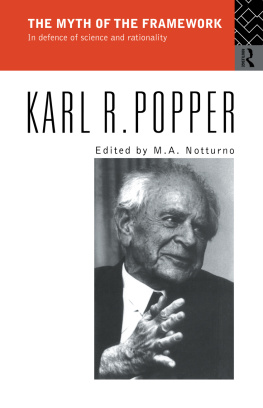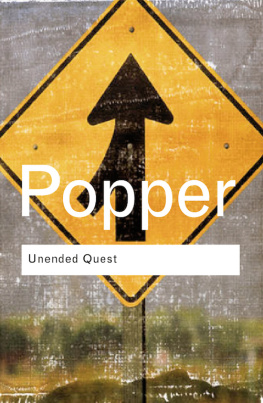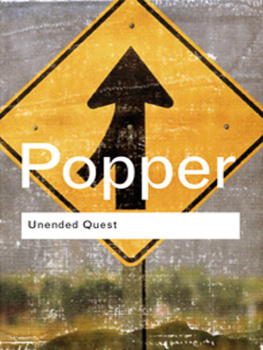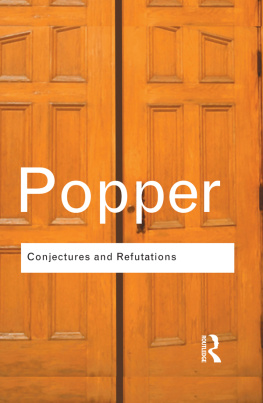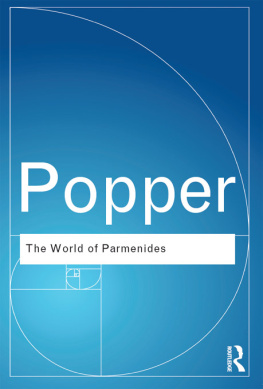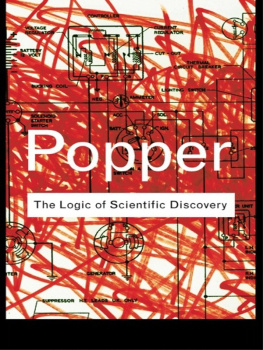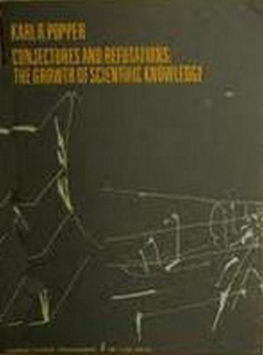Popper Karl - All Life is Problem Solving
Here you can read online Popper Karl - All Life is Problem Solving full text of the book (entire story) in english for free. Download pdf and epub, get meaning, cover and reviews about this ebook. year: 0, publisher: Taylor and Francis, genre: Romance novel. Description of the work, (preface) as well as reviews are available. Best literature library LitArk.com created for fans of good reading and offers a wide selection of genres:
Romance novel
Science fiction
Adventure
Detective
Science
History
Home and family
Prose
Art
Politics
Computer
Non-fiction
Religion
Business
Children
Humor
Choose a favorite category and find really read worthwhile books. Enjoy immersion in the world of imagination, feel the emotions of the characters or learn something new for yourself, make an fascinating discovery.
- Book:All Life is Problem Solving
- Author:
- Publisher:Taylor and Francis
- Genre:
- Year:0
- Rating:3 / 5
- Favourites:Add to favourites
- Your mark:
- 60
- 1
- 2
- 3
- 4
- 5
All Life is Problem Solving: summary, description and annotation
We offer to read an annotation, description, summary or preface (depends on what the author of the book "All Life is Problem Solving" wrote himself). If you haven't found the necessary information about the book — write in the comments, we will try to find it.
All Life is Problem Solving — read online for free the complete book (whole text) full work
Below is the text of the book, divided by pages. System saving the place of the last page read, allows you to conveniently read the book "All Life is Problem Solving" online for free, without having to search again every time where you left off. Put a bookmark, and you can go to the page where you finished reading at any time.
Font size:
Interval:
Bookmark:
ALL LIFE IS PROBLEM SOLVING
ALL LIFE IS PROBLEM SOLVING
Karl Popper
Translated by Patrick Camiller

First published 1999
by Roudedge
2 Park Square, Milton Park, Abingdon, Oxon, OX14 4RN
Simultaneously published in the USA and Canada
by Routledge
270 Madison Avenue, New York, NY 10016
First published in paperback 2001
Reprinted 2002, 2003, 2005, 2006, 2007
Routledge is an imprint of the Taylor & Francis Group, an informa business
First published in German 1994 by Piper Verlag, Munich
Alles Leben ist Problemlsen 1994 Karl Popper
1999, 2001 the Estate of Karl Popper
Translation 1999 Routledge
The right of Karl Popper to be identified as the Author of this Work has been asserted by him in accordance with the Copyright, Designs and Patents Act 1988
All rights reserved. No part of this book may be reprinted or reproduced or utilized in any form or by any electronic, mechanical, or other means, now known or hereafter invented, including photocopying and recording, or in any information storage or retrieval system, without permission in writing from the publishers.
British Library Cataloguing in Publication Data
A catalogue record for this book is available from the British Library
Library of Congress Cataloging in Publication Data
A catalog record for this book has been requested
ISBN 0 415 24992 9
CONTENTS
Publishers Note
In this translation, four chapters have been omitted from the original German version of Alles Leben ist Problemlsen, since all have appeared previously in English, in either identical or slightly varied form, in other works of the author published by Routledge: respectively of The Lesson of This Century, 1997.
The omitted chapters have been replaced by Towards an evolutionary theory of knowledge (). All were originally written in English.
The collapse of communism () was also written in English and translated into German for Alles Leben ist Problemlsen. This volume publishes the English original for the first time.
This translation by Patrick Camiller has been prepared with the assistance and advice of Melitta Mew and David Miller.
Preface
This collection of essays and talks may be seen as a sequel to my book In Search of a Better World. Both contain some contributions strongly oriented towards the natural sciences, and others strongly oriented towards history or politics. The title All Life is Problem Solving is also the title of , which strongly influenced the short but relevant Summary By Way of a Preface in that earlier collection. Here too, I have tried to give the preface more weight than prefaces usually have.
The selection of chapters has been made with the help and advice of my assistant, Mrs Melitta Mew, and Dr Klaus Stadler from Piper Verlag. I am deeply grateful to them both.
I
The first part of this book is called Questions of natural science. What I have in mind are mainly biology and the unfathomable wealth of living forms.
The more deeply we penetrate into the many areas of biology, from whichever angle, the more unfathomable does the wealth of biological structures prove to be, and the more prodigious their harmonious interplay.
The last chapter in Part I is devoted to Johannes Kepler, the great seeker after harmonies in Gods physical creation, and the great discoverer of the three laws that determine the motion of the planets in a highly abstract yet highly harmonious manner. Of the three intellectual giants who together, and with others, created our natural science the contemporaries Galileo and Kepler, and their successor Newton Kepler is perhaps the greatest. His is certainly the most attractive, open, and modest personality. All three were passionate seekers and tireless workers; all three toiled extremely hard, often with persistently disappointing results, but they were amply rewarded with the great joy of those who see the world in a new light differently, more beautifully and harmoniously, and also better than anyone before them and who then know that their hard work has been crowned with joy, almost undeserved because it could so easily have turned out otherwise.
Of the three great figures, Kepler was the only one who not only worked everything out but honestly and conscientiously wrote it all down. He also understood, as no one else did, that it was the Greek thinkers of the distant past from Thales to Aristotle, Aristarchus, and Ptolemy who had bequeathed their boldest ideas to Keplers inspirational model, Copernicus.
More than in the other two cases, it was his great modesty that again and again helped Kepler to see and learn from his own mistakes mistakes that could be overcome only with the utmost difficulty. Each of the three intellectual giants was, in his own way, caught up in a superstition. (Superstition is a word we should use only with the greatest caution, knowing how little we know and how certain it is that we too, without realizing it, are caught up in various forms of superstition.) Galileo most deeply believed in a natural circular motion the very belief that Kepler, after lengthy struggles, conquered both in himself and in astronomy. Newton wrote a long book on the traditional (mainly biblical) history of mankind, whose dates he adjusted in accordance with principles quite clearly derived from superstition. And Kepler was not only an astronomer but also an astrologer; he was for this reason dismissed by Galileo and many others.
But Kepler fought against dogmatic forms of his own astrological superstition: he was a self-critical astrologer. He taught that the fate written in the stars was not inexorable but could be mastered by our moral will. It was a major concession to the critics of astrology. Of the three great men, he was perhaps the least dogmatic in his superstition.
II
The second part of this book, Thoughts on history and polities, consists of a number of occasional pieces. It offers no advice or prescriptions, least of all infallible ones, but it does make the case for an attitude of responsibility.
I am naturally in favour of democracy but not in the way that most of its advocates are. Winston Churchill once said: Democracy is the worst form of government, only excepting all other forms of government. We have nothing better than to abide by majority decisions. A majority government is accountable, a coalition government much less so, and a minority government still less.
Democracy in the sense of rule by the people has practically never existed, and when it has, it has been an arbitrary and unaccountable dictatorship. A government can and should be accountable to the people. Rule by the people cannot be; it is unaccountable.
I am therefore in favour of democratically elected, constitutional government, which is quite different from rule by the people. And I am in favour of accountable government accountable first of all to those who elected it, but also, perhaps still more, morally responsible to humanity.
Never before have there been so many and such dreadful weapons in so many irresponsible hands a thousand times more than after the two world wars. The fact that this is so and that our political leaders accept it, is something for which they are accountable to us. We must hold them all to blame for it.
Most of our political leaders would be glad to change how things are. But they have inherited from their predecessors a world situation that was constantly deteriorating because of the gang-leaders arms race; and they seem, however reluctantly, to have come to terms with it. Any interference seems too risky and difficult. So they talk about it as little as possible.
Next pageFont size:
Interval:
Bookmark:
Similar books «All Life is Problem Solving»
Look at similar books to All Life is Problem Solving. We have selected literature similar in name and meaning in the hope of providing readers with more options to find new, interesting, not yet read works.
Discussion, reviews of the book All Life is Problem Solving and just readers' own opinions. Leave your comments, write what you think about the work, its meaning or the main characters. Specify what exactly you liked and what you didn't like, and why you think so.


